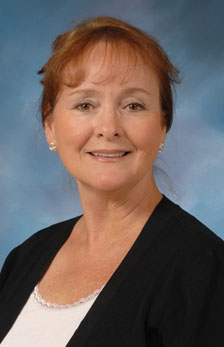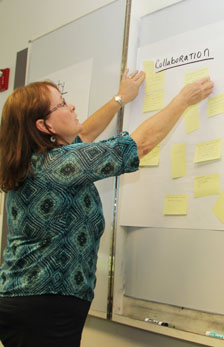Rehabilitation and Participation Science
Program in Occupational Therapy
 Last fall, Pat Nellis, MBA, OTR/L, joined the Program as clinic administrator for Community Practice. If she looks familiar, however, that’s because she is. Long before she officially joined the team, Nellis has been a recognizable face in the Program. As the director of rehabilitation services for Barnes-Jewish Hospital (BJH), she often collaborated with faculty members here regarding special projects, committees, and educational offerings. Since 2007, she’s also held a teaching role, instructing Management in a Changing Practice Environment. In 2011 she picked up Fundamentals of Professional Practice, and will be adding Research and Evidence-Based Practice to her plate this fall. “Pat’s background, knowledge, and leadership skills uniquely qualify her to lead our Community Practice,” shares Program director Dr. Carolyn Baum. “Her ability to conceptualize the big picture, while simultaneously managing day-to-day operations results is a perfect balance for our team.”
Last fall, Pat Nellis, MBA, OTR/L, joined the Program as clinic administrator for Community Practice. If she looks familiar, however, that’s because she is. Long before she officially joined the team, Nellis has been a recognizable face in the Program. As the director of rehabilitation services for Barnes-Jewish Hospital (BJH), she often collaborated with faculty members here regarding special projects, committees, and educational offerings. Since 2007, she’s also held a teaching role, instructing Management in a Changing Practice Environment. In 2011 she picked up Fundamentals of Professional Practice, and will be adding Research and Evidence-Based Practice to her plate this fall. “Pat’s background, knowledge, and leadership skills uniquely qualify her to lead our Community Practice,” shares Program director Dr. Carolyn Baum. “Her ability to conceptualize the big picture, while simultaneously managing day-to-day operations results is a perfect balance for our team.”
Nellis has served in a variety of roles throughout her career, with an emphasis in the hospital setting. Prior to her time at BJH, she also worked at Missouri Baptist Medical Center (MBMC). In both positions, she led large, interdisciplinary teams including audiology, occupational therapy, physical therapy and speech language pathology. With that territory came program development for emerging practice areas such as lymphedema and cancer survivor care; trauma care; care for the very sick in ICU settings; and at MBMC, associated outpatient programs. In each role, Nellis’ approach was to penetrate the existing teams of nurses, physicians and case managers and identify where rehab could add value to help reduce and/or mitigate some of the hospital-acquired issues such as decubitus ulcers, deconditioning, and pneumonia.
 She also worked to integrate evidence-based practice into the environments, as it was not in place at either facility prior to her arrival. “All of my previous teams had an active agenda of reviewing each population, developing standards of care/clinical practice guidelines and then measuring our quality of delivery by evaluating whether or not our standards were met,” says Nellis. “If not, our team problem-solved to meet our goals.”
She also worked to integrate evidence-based practice into the environments, as it was not in place at either facility prior to her arrival. “All of my previous teams had an active agenda of reviewing each population, developing standards of care/clinical practice guidelines and then measuring our quality of delivery by evaluating whether or not our standards were met,” says Nellis. “If not, our team problem-solved to meet our goals.”
Nellis’ focus on quality and standards of care will continue in her new role with Community Practice, where she has spent the first six months implementing structure and aligning systems. “I joined this team because I really wanted the challenge of bringing OT services to an interprofessional team in a non-institutional setting,” shares Nellis. Much of that work thus far has revolved around the implementation of EMR, or electronic medical records within Community Practice. “Charting electronically increases our efficiency, helps provide more information for our entire team, and better enables us to communicate with our clients’ physicians,” shares Nellis. “It’s the future of health care and was the next step in growing our practice.”
Growth is a major focus of the clinic, which aims to ensure that members in the community have access to quality health care and beneficial resources. She also plans to link research to quality and outcomes that are valued by the Practice’s clients. “The implementation of the Affordable Care Act (ACA) and potential to be on the cutting edge of practice and reimbursement changes brings significant benefit to our program,” shares Nellis. “Health care needs to be delivered to populations and at the community level, by a team of individuals.”
Another passion for Nellis is quality improvement and the lean sigma approach in health care. “There remains much improvement to be gained in this area for rehab – currently, we all are asked to report under the Physician Quality Reporting System (PQRS). If you look closely, those standards are very biomedical and really report mostly whether or not we adhered to a process. For us, we not only want to report on those, but also to report outcomes as they relate to improvement over time.” Tracking data and measuring results will be a primary focus for the Community Practice team over the coming months. “We are always data-mining,” shares Nellis. “The collection and analysis of data determines next steps, tells the story of what’s working well, and identifies areas of opportunity,” she adds.
Nellis’ experience in leading teams includes a wealth of training and coaching, gained through her completion of programs in change management, KT Decision Making, project management, and diversity and inclusion, among others. “I enjoy growing teams, and will do the same here,” she shares.
We welcome inquiries from prospective students, potential collaborators, community partners, alumni and others who want to connect with us. Please complete the form below to begin the conversation.
Schedule an Info Session
We are excited that you are considering applying to the Program in Occupational Therapy at Washington University. Please join us for a Zoom Information Session for either our entry-level MSOT or OTD degrees or our online Post-Professional OTD. Current faculty members will discuss the degree program and answer any question you may have. We are offering these sessions on the following days and times. The content is the same for each one, so you only need to sign up for one.
Upcoming ENTRY-LEVEL Degree ZOOM Info sessions:
Schedule an Entry-Level Info Session
Upcoming PP-OTD Degree ZOOM Info session: